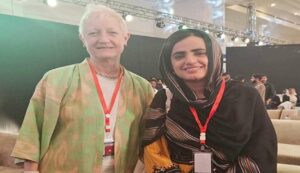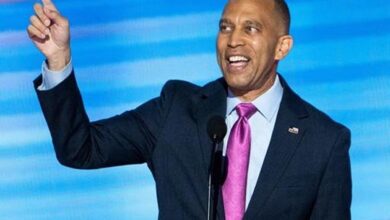Baloch leaders hold meeting with EU delegation to draw attention to human rights violations
Mahrang and Sabiha Baloch, two Baloch political activists, met with a team from the European Union on Wednesday to draw attention to violations of human rights in Balochistan.

They spoke about things like harassment, limits on nonviolent political activity, and enforced disappearances.
In a post on X, Mahrang Baloch provided information on the meeting, writing, “Sabiha Baloch and I recently met with the EU delegation to address the urgent situation in Balochistan.”
“Thank you, EU, for your time and attention,” she said in her expression of thanks. We encourage the European Union to address the pressing human rights abuses, enforced disappearances, and suppression of nonviolent protests in Balochistan.
In a statement posted on X, the EU Delegation to Pakistan acknowledged the meeting, saying, “Ahead of an intense week of EUPK bilateral consultations, Deren Derya, Head of Pakistan & Afghanistan Division EU officials, welcome the opportunity to connect with human rights defenders, incl. from Balochistan to discuss fundamental rights & socio-economic situation.”
https://twitter.com/MahrangBaloch_/status/1859226652963971132
According to the statement, among the subjects covered at the talks were “fundamental rights and the socio-economic conditions in Balochistan.”
This summit was held in the backdrop of growing international concern about violations of human rights in Balochistan, including the repression of free expression, the harassment of women and children, and the increase in enforced disappearances. In order to redress these transgressions and guarantee accountability in Balochistan, the activists called on the EU to act swiftly.
For many years, human rights abuses in Balochistan have been a serious and ongoing problem. In Pakistan’s Balochistan region, ethnic Baloch have long accused the government of systematic marginalization, discrimination, and denial of political autonomy. With allegations of extrajudicial executions, enforced disappearances, and torture of activists, journalists, and civilians, the Pakistani government has come under fire for violently putting down Baloch nationalist movements.
These crimes have been linked to Pakistan’s military, intelligence services, and paramilitary forces, who often target pro-independence and Baloch rebel organizations while claiming to be conducting counter-insurgency operations.
Despite its abundance of natural resources, including minerals, oil, and gas, Balochistan also faces extensive economic underdevelopment in addition to the violence. Growing dissatisfaction among the Baloch has been exacerbated by this economic inequality as well as restricted access to infrastructure, healthcare, and education.





